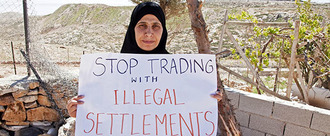- Featured
- Animal Rights
- Anti-racism
- Arts & Culture
- Children
- Climate
- Corporate accountability
- Crime
- Disability rights
- Economic
- Education
- Environment
- Food and Sustainable Production
- Gender Equality
- Governance and Transparency
- Health
- Housing
- LGBT Rights
- Mental health
- Northern Ireland
- Planning
- Privacy and Data Protection
- Rural Inequality
- Social Justice
- Trade
- Transport and Infrastructure
- Workers' Rights
- More
-
Bring Back Barista BusThe Barista Bus is a locally owned micro business that traded from a small patch of privately owned land across from Blackrock tower, which they had rented from the owner legitimately since the summer of 2018. Due to the city council claiming the bus was an unauthorized development (though it is mobile and temporary) the local business was told to cease trading as the area is zoned residential. Recently four very large concrete blocks were placed at the little site opposite Blackrock, presumably to prevent access to the site, following press coverage and public outcry the blocks were removed. Barista Bus is a homegrown enterprise that has become part of the community and the charm of Salthill. Swimmers, walkers, locals and tourists alike were delighted with this addition to the Blackrock area. Galway city councils approach to planning is discouraging start-up enterprises and innovation from endeavoring to try something new. Our council should be doing everything in its power to encourage flourishing indigenous start-ups. We find it incredibly difficult to believe that anyone other than the council have the means, ability or will to place and/or remove giant concrete blocks as were placed on the site to prevent Barista Bus from accessing it. The councils methods of dealing with issues such as this, especially in cases dealing with private land, is entirely archaic. We are calling on the council to reverse their decision, to grant retention and/or allow for an exemption on this small patch of land, to allow the Barista Bus to resume trading. How can you help? Start by signing the petition which will be presented to Galway City Council, but also contact your local representatives2,410 of 3,000 SignaturesCreated by John Crowley
-
#PassTheBillsAccording to the latest IPCC report, the next twelve years are crucial for action on climate change. There are four ambitious climate and environmental Bills which have been brought by Opposition Parties to the Dail. If the government truly wants to make Ireland a leader on climate change, it should support the passage of these Bills immediately. These are - The Climate Emergency Measures Bill (Bríd Smith PBP) - The Microgeneration Support Scheme Bill (Sinn Fein) - The Just Transition (Worker and Community Environmental Rights) Bill (Green Party) - The Waste Reduction Bill (Green Party) This is a simple ask. These are all sensible Bills which will move Ireland towards being a cleaner, greener and fairer place to live. We have no time to wait. #ClimateActionNow248 of 300 SignaturesCreated by Climate Friends
-
Support the Occupied Territories Bill for its next stage in the DAIL on 24/1/19 (Irish Parliament)‘The Control of Economic Activity (Occupied Territories) Bill, 2018’ seeks to ban imports to Ireland from illegal settlements in countries which are illegally occupied, in breach of International Law. This is a chance for Ireland to stand up for the rights of vulnerable people – it is about respecting international law and refusing to support illegal activity and human suffering. Under international law (the Geneva Convention), the transfer by a State of its civilian population into a territory it has militarily occupied is a war crime. This legislation would apply to territories where there is a clear international legal consensus on the status of the occupation. As it stands, only the occupied Palestinian territories have been confirmed as occupied by the International Court of Justice. This Bill does not implement a boycott of Israeli goods, or single out Israel. It only bans the import and sale of goods produced in settlements that are illegal under international law. The European Union’s position is absolutely clear: Israeli settlements in the occupied Palestinian territory are “illegal under international law, constitute an obstacle to peace and threaten to make a two-state solution impossible”. Despite this, EU states, including Ireland, continue to make the settlements financially viable through trade and economic activity. The legal basis of the Bill and its permissibility under EU law are confirmed by several formal legal opinions: Michael Lynn, Senior Counsel in Ireland, Professor James Crawford of the University of Cambridge, Senior Counsel in the UK and one of the most eminent authorities on international law worldwide and former Attorney General Senator Michael McDowell have all confirmed the legality of the Bill. This Bill has cross-party support from all parties in the Dáil and Seanad but the government is refusing to support it. This is why we are calling on Minister for Foreign Affairs Simon Coveney and his party to back this Bill as we want all the people of Israel and Palestine to live in peace and security. We stand in support of international law and for the principles of peace and justice.1,244 of 2,000 SignaturesCreated by Gerry O'Sullivan
-
Fianna Fail: Don't drop support for Palestine & the Occupied Territories BillThe Control of Economic Activity (Occupied Territories) Bill 2018 seeks to prohibit the import and sale of goods, services and natural resources originating in illegal Israeli settlements on Palestinian land. Such settlements have been condemned as illegal by the UN, EU, the International Court of Justice and under Irish law. They result in human rights violations. There was a standing ovation in the Seanad when the Bill passed a historic stage vote in July. Since then there has been an overwhelming positive response from the Palestinian people, and a large section of the international community. The Bill returns to the Seanad for the next stage on 28th November 2018. The Bill has however raised criticism from Israel, and Fine Gael are backing down on the advise of the Attorney General. The EU has expressed concern over " the EU’s competence on trade matters”. Given Fianna Fail's strong record on the issue we beseech the party to be resolute supporting this Bill, reasserting Ireland's commitment to justice, peace, and the rule of law. It is important that Ireland leads the way at a time when many of these values are under threat around the world. Fianna Fail may hold the numbers to either make or break this Bill becoming ground-breaking legislation to tackle the issue of illegal Israeli settlements, which may even constitute war crimes under the Geneva conventions. Will the party continue its support?179 of 200 SignaturesCreated by Dette Loughlin
-
Ireland for Sensible Drug PolicyDrug Policy, and the war on drugs has had children, parents, politicians and stranger murdered in broad daylight. Thanks to gang activity, I myself shake and fear at the noise of bangers going off. The entire country lives in fear of gangs, gangs fed through drug money, drug money coming from the "black market". Little do they realise that the failing drug policy, the politicians and their lobbyists are directly financing this through their stern, "moral" views on dirty drugs. It is absolutely unacceptable. I am sick & tired of burying my friends and lending their brokenhearted families a soaking shoulder to cry on because the government failed them. The governmental position on drugs, the policy set in place in the early 1970's, has absolutely failed them. Where were you when they found their bodies, that nobody heard of because the news would rather report the stash of Class A narcotics they found in a shed, behind a burnt out house and a car filled with hand guns and machetes. Where were you and where are you now? What are you going to do to change this? My name is Sandy Brun, I am a qualified Toxicologist and I hope to graduate with a Master's degree in Neuroscience & Pharmacology. You can find me on LinkedIn. I am sick and tired of burying my friends with dirty drugs in their veins, up their noses and everywhere else. I am sick and tired of being let down by this never ending agonizing political situation that is murdering my friends and breaking the hearts of their families. I've lived in Ireland since I was 10 years old, and I've buried a friend every year since I was 13. You're so proud of the 100th 1916 Easter Rising anniversary that the country celebrated 2 years ago. You're so damn proud to be Irish. You're so damn prejudicial and soft. Stand and fight. For our sons and daughters.38 of 100 SignaturesCreated by Sandy Brun
-
Save Our Qualified Pharmaceutical AssistantsThe Pharmaceutical Society of Ireland (PSI) Council approved rules that will mean that 248 women- in their late 50's, with an average 35 years of experience working as qualified professionals, will lose their livelihoods. The new rules would restrict a qualified Pharmaceutical Assistant (PA) to working ONE HOUR PER DAY in the absence of a pharmacist, rendering the qualification worthless and the job position economically unsustainable. If the new rules are signed into law by the Minister for Health, PA's will no longer be able to provide professional cover for pharmacists’ day off. “It is not possible to get locum cover so if the PA can’t cover I may have to remain closed some Saturdays…It’s fairly disastrous for pharmacy in Ireland”, a pharmacist explains in research carried out to assess the impact of the rules on pharmacy services. PA's have worked on average 18 years in their present pharmacies and know their customers very well. Continuity of care is paramount to patients' health and safety. This is something that PA's offer but the PSI have totally disregarded and ignored this crucial cornerstone. PA's like Sarah explain how “I will be out of a job. I am only 60 and state pension only available at 67…I have two children in college…it will be a financial disaster…I need my work and my money “, Marie spoke of how “I still have a mortgage so am worried about keeping my family home as I am a widow with a disabled adult living with me” NO consideration or provision for compensation has been made by the PSI, in drafting these rules.2,154 of 3,000 SignaturesCreated by Vyra Hardy Nayar
-
Bring the Baby Blimp to the BannerTo facilitate peaceful protest to Trunp and his policies and to respect the political heritage of Co Clare, the Banner County.,15 of 100 SignaturesCreated by Michael McNamara
-
Go Hydrogen.Major breakthroughs are being made in the hydrogen technology sector in transport, energy production and storage. The production of hydrogen is getting greener month on month. Worldwide, countries are running trials with hydrogen as it's main source of it's green transport needs for the future. If the Irish government fails to include Hydrogen in future plans then we will be left behind yet again. We have the capacity as a nation both in our technology and chemistry sectors, to drive this forward and to lead the way on green technology.24 of 100 SignaturesCreated by Tony Ryan
-
Call On LloydsPharmacy to Accept Labour Court RecommendationLloydsPharmacy workers deserve respect from their employer. In their own words: "Employee's don't get the credit they deserve. The company are willing to see experienced staff leave rather than pay them what they deserve." "For the work, advice and care we give to our customers we are very undervalued and underpaid." "I have no guaranteed hours in my contract even though I normally work 38 hrs. We were rejected for mortgage because I have no set hours in my contract. When I asked for my hours to be put in the contract I was told it couldn't be done. I don't think that's fair." Our Mandate members do not want to be on strike, and are only taking this action as a last resort. We sincerely apologise for any inconvenience caused to the public but we ask for their understanding as our members are forced to take action. Lloyds Pharmacy refuses to engage with their trade union despite a Labour Court recommendation that stated: ‘“the Court recommends that the parties engage in order to seek agreement in relation to the matters raised by the Trade Union…’ Yet Lloyds Pharmacy management continue to ignore the Court, their members and their designated representatives. Mandate has been campaigning for improvement in working condition in LloydsPharmacy, including: • A pay increase and incremental pay scales; • The introduction of a sick pay scheme; • Security of hours and the elimination of zero hour contracts; and • Improvements in annual leave entitlements and public holiday premiums. LloydsPharmacy Ireland operates 88 stores across the Republic of Ireland with approximately 800 staff in their retail business. They are owned by the largest pharmaceutical company in the world, McKesson Corporation, which has revenues of $198.5 billion (€169 billion – more than double the annual revenue of the Irish government).6,302 of 7,000 SignaturesCreated by Brian Forbes
-
Stronger legislation to prevent discrimination against mental health in workplacesIts important because anxiety and depression can affect one in 6 people. As one of them I want to be able to contribute positively to society. I want to be able to be able to work. I want to be able to work with an organisation where having anxiety does not mean I live in fear of loosing my job if my employer finds out. Or be discriminated from promotions or progressing in an organisation if they know I have anxiety. I want to fulfil my potential and be treated with dignity not with misunderstanding or stigma.17 of 100 SignaturesCreated by Cat Mc
-
Help Temple Bar Food MarketTemple Bar Food Market was set up 21 years ago by a group of growers and producers with a vision to bring Irish, artisan, local and high quality produce to a city centre location. These traders have committed to the market and seen it go from strength to strength over the years, with the support of customers old and new. With the dissolution of Temple Bar Cultural Trust, TBFM is now being run by Dublin City Council. Therefor Meeting House Square has gone from being private property to a public site, which requires all traders to acquire a casual trading licence to trade. Our current bye-laws were introduced by Dublin City Council on March 4th 2013. These bye-laws are now being reviewed by public consultation. Below are some of the new terms and conditions of trading. These T+Cs apply to all casual trading licences in the city - from bric a brac, to flowers, hawkers and food markets. Temple Bar Food Market is also subject to these, and clearly one size does not fit all! We are asking our customers to sign this petition in solidarity with traders to have our amendments considered and taken on board before these new bye-laws come into effect. They may seem like small insignificant details, but they have a huge impact on the running of small businesses and the food market as a whole. WHAT YOU CAN DO! Act now to help the market — sign the petition. We will include this act of support in our submission. Copy and paste our amendments below and send them as a submission with regards specifically to TBFM to [email protected] All this helps to make it clear we want the integrity of the market maintained under the hands of Dublin City Council! Deadline for submission: before 17.00 on Thursday 29th March, 2018 NEW TERMS AND CONDITIONS OF TRADING 1 "VACANT PITCHES Designated area trading pitch allocation policy Vacant pitches will be offered on a first come first served basis, except in the case of new areas which will be allocated by lottery." A first come first serve basis will not work for TBFM, nor a lottery system. We need a quality control measure whereby applicants need to show their high food standards. We also have a quota for hot food which is full, and so only grocery and produce based stalls should be considered until a hot food stall leaves. There has been an exception made for producers who are selling their own produce alongside a hot food offering - as this hot food offering helps to promote the product. i.e Broughgammon Butchers. Specific areas we are missing and would be welcome are: fishmonger, loose leaf tea, fermented goods 2 "PITCHES Pitch numbers according to DCC: 23" We have 22 pitches currently occupied - we have two pitches free. Therefore, the total number of pitches is 24. 4 "PRESENCE OF LICENCE HOLDER/STAFF A licence holder may nominate a maximum of two agents to assist in the operation of a designated trading stall under the following terms and conditions: (maximum now included) There may only be a maximum of two people operating the stall at any one time and each of them must be trading within one metre of the stall. (maximum now included) The licence holder must be present at all times where practicable. It is acceptable that the licence holder be absent during holiday periods or due to illness but this absence must be advised to the Casual Trading Section as soon as practically possible. Phone: 01-2222165 E-mail: [email protected]. A medical certificate is required for prolonged period of absence." Traders at TBFM would often have more than two staff members, or have rotating staff lists. It would be impractical to restrict a stall to two specific staff members or ‘agents.’ We would ask that this particular term be waived for the market. It is also impractical for the licence holder to be present at all times - with or without the excuse of illness. Many licence holders would be responsible for other markets on the same day, deliveries etc, and therefore leave their stall in the capable hands of staff. 5 "WASTE MANAGEMENT The removal of waste generated at each trading stall is the responsibility of the trader. Under the Waste Management Act 1996 traders have two options to dispose of their waste: Arrange for a private waste disposal company to do it. The trader can arrange to dispose of their waste in an alternative proper manner. Both options must comply with the Waste Management Act 1996 and relevant EU regulations/directives. Traders are reminded that when they are disposing of their waste and either fail to do so or do it in a way which infringes the Waste Management Act 1996 they are liable to be prosecuted by the local authority. Traders are also reminded of their responsibilities under the Protection of the Environment Act, 2003 and the Litter Pollution Act 1997." Currently TBFM waste disposal is organized by the management company employed by DCC. This includes public waste i.e. created by customers purchasing food at the market. This does not include personal waste, which traders already dispose of themselves. The traders would like to know who will be responsible for this public waste. The traders also wish to know if a management company will be kept in place after the introduction of the bye-laws - as much of the smooth running of the market relies on this. 6 "TRADING HOURS Saturdays Only : 7a.m.-9.45.a.m. for set up Trading hours 10 a.m.-4.30 pm. Pack up 4.30 p.m. -6.30 p.m." We would like our trading times changed to: Saturdays Only : 7a.m.-9a.m. for set up Trading hours 9 a.m.-5.00 p.m. Pack up 5.00 p.m.- 6.30 p.m. 7 "UNAUTHORISED ADS/BANNERS Attaching commercial advertisements or unauthorised banners or material to a stall is prohibited. (New)" Some traders at TBFM would use their stall as a notice board for outside events, workshops and other food related activities, both for themselves and to support others in the food industry.136 of 200 SignaturesCreated by Liadain Kaminska Ní Bhraonáin
-
No Mass Harvesting of Seaweed on Coastline from Mayo to ClareThe government is supposed to reach a decision in April 2018 on whether or not to grant a license for the right to mechanically harvest seaweed to a private Canadian company. The sale was complicated by a legality. The ownership of the right to harvest seaweed is currently under question. Traditionally local people, owned the rights to harvest seaweed and harvested it in a sustainable way. Mechanically harvesting seaweed is not environmentally sustainable and will have a serious impact on the ecology of the sea. Harvesting rights to seaweed belong to the people and should not be allowed to be sold off by the State for private profit. Seaweed is now a highly lucrative resource which should be harvested in a sustainable way for the benefit of the people of Ireland living now and for future generations.3,137 of 4,000 SignaturesCreated by Noeleen Moran











.jpg)
